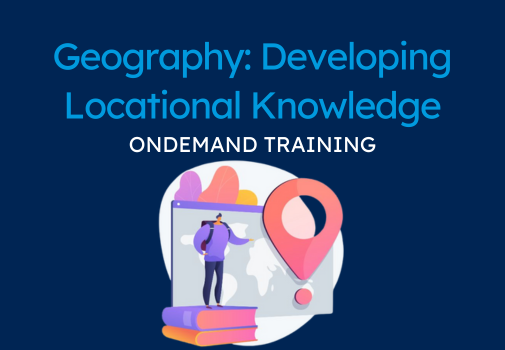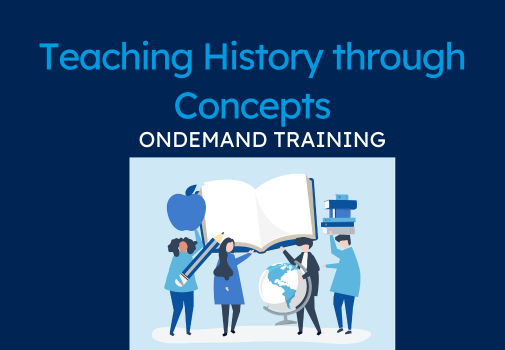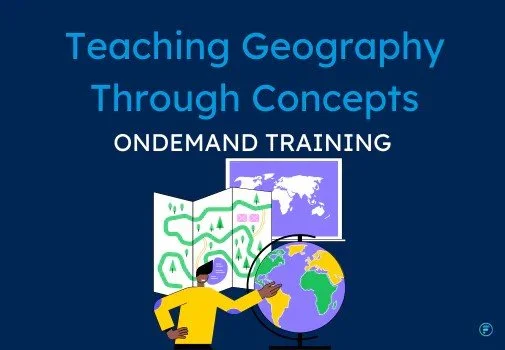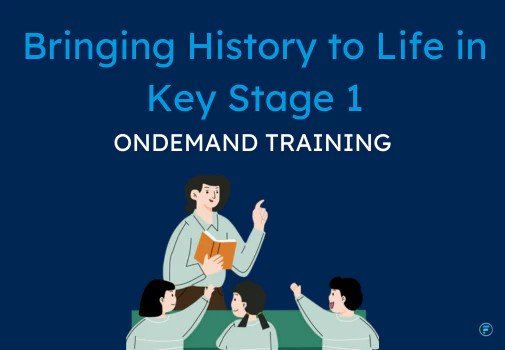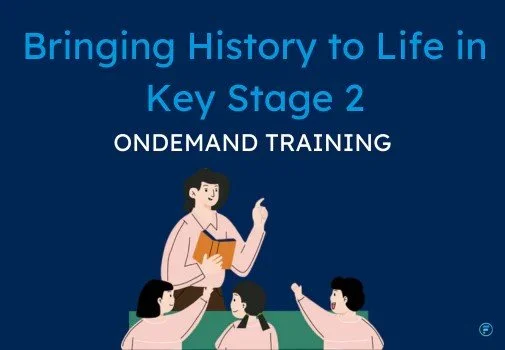On Demand clips
Mini clips
-
![]()
teaching history through concepts
Within the National Curriculum there are various substantive concepts that run throughout. These are the 'big ideas' that we want children to focus on in order to identify and make links between different aspects of History.
During the session, we will consider:
How well you understand and know the historical concepts within your curriculum
How these concepts can be built into existing History topics
-
![Infographic with the title 'Using Timelines Effectively' and subtitle 'On-Demand Training,' featuring a horizontal timeline with interconnected circular nodes.]()
Using timelines effectively
Using timelines effectively will support the children to develop their chronological understanding, and provide clear scaffolds and frameworks that they can utilise when considering the 'chronological narrative' of Britain's history.
During the session, we will consider:
The importance of chronology
What a timeline really is and why they are an important resource for children
How to develop strategies for using timelines successfully
Midi clips
-
![]()
including black british history in the curriculum
Diversity within the curriculum that we teach is extremely important. Schools and communities across our country are extremely diverse and this should be reflected within the content that we teach. History in particular is an area where we can expose children to the diverse nature of the world around them.
During the session, we will address:
• Why black British history is so important.
• How it can be included within the primary history curriculum across the school.
• Key figures and events that link to NC areas of study.
• How we can approach some of the difficult aspects of black British history.
-
![Illustration of a person pointing at a map on a screen with text saying 'Geography: An Approach to Fieldwork, On-Demand Training.']()
Geography - Developing an approach to Fieldwork
A huge part of teaching Geography is developing skills in fieldwork. The National Curriculum states that it aims to ensure that children can “collect, analyse and communicate with a range of data gathered through experiences of fieldwork that deepen their understanding of geographical processes”.
During the session, we will consider:
• What constitutes good fieldwork
• Where fieldwork can take place
• How we can develop children’s knowledge through the use of fieldwork
• Using field sketching to enhance Geography
-
![Digital illustration promoting on-demand training in geography, focusing on developing locational knowledge. Features a person interacting with a large map and a location pin, with books nearby.]()
Geography - Developing Locational Knowledge
The National Curriculum states that it aims for all pupils to “develop contextual knowledge of the location of globally significant places – both terrestrial and marine – including their defining physical and human characteristics”. This is really important knowledge that we need to teach our children, and how we do this can have a real impact across the curriculum.
During the session, we will consider:
• The locational knowledge that children are expected to know
• Different types of maps – OS, topographical etc.
• Cross curricular map work (focusing on historical links)
• Using maps for progression year on year
-
![Illustration of a person examining an ancient artifact with text "Developing Chronological Understanding On-Demand Training" on a blue background.]()
History-Developing Chronological Understanding
The National Curriculum states that it aims for all pupils to “know and understand the history of these islands as a coherent, chronological narrative, from the earliest times to the present day.” It also makes reference to “how Britain has influenced and been influenced by the wider world.”
During the session, we will consider:
• The chronology of events in Britain and the wider world from the Stone Age to present
• British people and/or events that have influenced the wider world
• People and/or events across the wider world that have influenced Britain
• How timelines can be presented and used in different ways in order to promote chronological understanding.
-
![Illustration showing figures holding educational symbols like an apple, books, and a globe under the text 'Teaching History through Concepts OnDemand Training.']()
Teaching History through Concepts
The National Curriculum states that “A high-quality history education will help pupils gain a coherent knowledge and understanding of Britain’s past and that of the wider world.” And that “It should inspire pupils’ curiosity to know more about the past.” In order to gain that depth of knowledge and understanding and to inspire curiosity, the children need to be shown the links between different time periods and historical peoples – the golden threads if you like.
During the session, we will consider:
• How well you understand and know the historical concepts within your curriculum
• How these concepts can be built into existing History topics
• A different approach to teaching History that is concept driven
-
![Teaching Geography Through Concepts on-demand training graphic with a person pointing to a map, a globe, and a world map diagram.]()
Teaching Geography Through Concepts
Description goThe National Curriculum states that,
“A high-quality geography education should inspire in pupils a curiosity and fascination about the world and its people that will remain with them for the rest of their lives.” And that, “Teaching should equip pupils with knowledge about diverse places, people, resources and natural and human environments, together with a deep understanding of the Earth’s key physical and human processes.” In order to gain that depth of knowledge and understanding and to inspire curiosity, children need to be shown the links between different aspects of geography – the golden threads if you like.
During the session, we will consider:
• How well you understand and know the geographical concepts within your curriculum
• How these concepts can be built into existing geography topics -
![Graphic with text "Teaching Science Through Concepts ONDEMAND TRAINING" featuring a person with a large light bulb, science symbols, and blue background.]()
Teaching Science Through Concepts
The National Curriculum states that,
“…all pupils should be taught essential aspects of the knowledge, methods, processes and uses of science.” And that, “Through building up a body of key foundational knowledge and concepts, pupils should be encouraged to recognise the power of rational explanation and develop a sense of excitement and curiosity about natural phenomena.” In order to gain that depth of knowledge and understanding, and to inspire curiosity, children need to be shown the links between different aspects of science – the golden threads if you like.
During this training, we will consider:
• How well you understand and know the scientific concepts within your curriculum
• How these concepts can be made more explicit within science topics
• How using concepts to develop your progression can support the retention of knowledge in science
-
![Illustration of a teacher holding a book and engaging with children, promoting 'Bringing History to Life in Key Stage 1 On-Demand Training' in blue text on a dark background.]()
Bringing History to Life in KS1
History is a fantastic subject to explore. It can offer so much to children in terms of knowledge and skills that can be applied to other subject areas and across different contexts. We must support children to develop these in an engaging way and work hard to really bring history to life.
There are some amazing aspects of history we can approach in KS1 that can really set children up for further studies in the subject and beyond. If we can get those initial building blocks in place, our children will develop a love of the subject and develop life-long skills in a purposeful and relevant way.
During this video, we will consider:
• The significant aspects of history we are expected to teach in KS1;
• The subject knowledge required to teach KS1 history well;
• Innovative ways to approach the teaching of history in KS1;
• Developing learning using an enquiry approach;
• Utilising books to really engage learners in history and reading alongside each other.
-
![Illustration of a teacher with students, under the text 'Bringing History to Life in Key Stage 2 On-Demand Training.']()
Bringing History to Life in KS2
History is a fantastic subject to explore. It can offer so much to children in terms of knowledge and skills that can be applied to other subject areas and across different contexts. We must support children in developing these in an engaging way and work hard to bring history to life.
There are some amazing aspects of history we can approach in KS2 that can really set children up for further studies in the subject and beyond. If we can build on the learning that has successfully been put in place in KS1, our children will develop a love of the subject and life-long skills in a purposeful and relevant way.
During this training, we will consider:
• The significant aspects of history that we are expected to teach in KS2;
• The subject knowledge required to teach KS2 history well;
• Innovative ways to approach the teaching of history in KS2;
• Developing learning using an enquiry approach;
• Utilising books to really engage learners in history and reading alongside each other.






